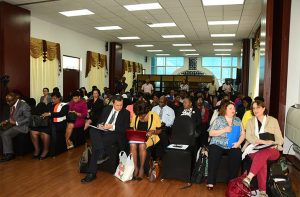…urged to teach children to be critical thinkers
AS educators from the Latin America and Caribbean Region consult on developing standards for the teaching profession, CARICOM Assistant Secretary General, Human and Social Development Directorate, Dr. Douglas Slater, said educators should teach children how to become critical thinkers and not limit their ability to particular content at particular stages of their lives.
In his address at the Regional Consultations on Developing Standards for the Teaching Profession: Latin America and the Caribbean Region, at the Arthur Chung Convention Centre on Wednesday, Dr. Slater said what is needed, are forms of education that ensure innovative and sustainable living as the Region navigates this contemporary environment.
“Education transformation demands that we correct and address the errors of the past,” the Assistant Secretary-General said while noting that in the Caribbean and Latin America Region, education through its colonial inheritance sought to limit children’s capacity to create, respond and adopt.
As such, he said it is important to enhance educational delivery by shifting the education paradigm from knowledge consumers to knowledge producers and knowledge innovators.
“The contemporary dynamics of the 21st Century requires a dispositional repository where skills and competences are favored over content,” he posited. He said it is important that children be taught how to learn and not what the child should learn.
Looking to China, Dr. Slater said the country, which has a student population of almost 200 million, is making significant changes to its education system. “China is at the point where the country realises its needs to build more innovation into the education system because they need to move from largely a manufacturing economy to technological-oriented economy,” he explained.
As such, he said the conversation that is currently ongoing with respect to the teaching profession, its needs and development, is both timely and critical. Alluding to CARICOM Human Resource Development 2030 Strategy – Unlocking Caribbean Human Potential takes into focus issues affecting the education system, and sets a platform for curriculums to be relevant and education delivery equitable. He said the strategy will help the Region’s people to navigate emerging opportunities and create new waves of sustainable development.
It was at the 34th Meeting of the Council for Human and Social Development (COHSOD) that draft standards for the teaching profession were submitted to the Regional Education Ministers as they considered the Regional Action Plan for the Human Resource Development 2030 Strategy.
United Nations Education, Scientific and Cultural Organisation (UNESCO) Office Director in Kingston, Katherine Grigsby, like Dr. Slater, underscored advancements in the education sector globally, noting that education extends beyond knowledge gathering but calls for critical thinking. “Role of teaching has shifted, but teachers have not become strategic facilitators,” she posited.

Guyana’s Chief Education Officer (CEO), Dr. Marcel Hutson, said that creating standards for the teaching profession is a timely initiative, noting that such is required to transform the education sector.
“Standard for teachers and teachers’ educators are paramount. Why? Teacher educators are strategically positioned,” he posited.
Deputy Vice-Chancellor – Planning and International Engagement of the University of Guyana, Dr. Barbara Reynolds, said that during the consultation, the role of the participants is to think about equipping teachers, not necessarily with standards that are external to their context, but that will help teachers to help the children fulfill their potential.
Minister of Education, Science and Technology – Antigua and Barbuda, Michael S Browne, centred his presentation on three pillars – context, content and continuous assessment. He said that technology has evolved to the point where it can make education more fruitful.
He said that as it relates to context, the purpose of what is being taught and to whom.
Minister Browne noted that context tools are key to helping students learn, while continuous assessment would inform educators about why they have been teaching.
Meanwhile, Minister of Education, Culture, Youth Affairs, Fisheries and Agriculture – British Virgin Islands, Natalio Wheatley, said that it is important to set a high threshold for those wishing to enter the profession. He noted that in the British Virgin Islands, there is the consideration to issue licences to teachers. It is proposed that teachers must be of high standards to acquire the licence and must maintain those standards to keep it.
According to the BVI Minister of Education, this is just one way of evaluating teachers, but made it clear that it would not be used as a punitive measure but rather as a means of offering help to teachers. He said that teachers need support now more than ever.
Meanwhile, Ms. Katherine Grigsby, Director UNESCO Office in Kingston, said that due to globalisation, technology has influenced how students gather information and interact.
The meeting is being held as part of UNESCO and the International Task Force on Teachers for Education 2030 and Education International’s efforts to build a framework of guidance to support governments and teacher organisations to: agree and implement a common understanding on teaching and teaching quality; ensure the quality of teacher training curricula and qualifications through standards describing skill profiles at different stages of the teaching career. Additionally, it is intended to safeguard a joint regulation of the teaching profession by detailing the mechanisms of governance and accountability to ensure the provision of quality teacher training and, consequently, quality teaching.



.jpg)











